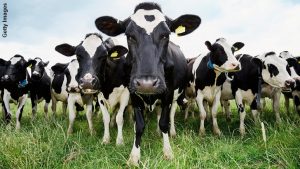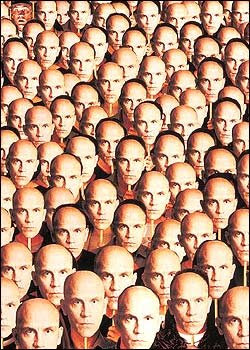Soulless Replicas:
China’s Factory To Clone Both Animals And Humans!
December 1, 2015
The world’s biggest animal “cloning factory” is due to open in China,
producing one million calves a year, sniffer dogs and even genetic copies of the
family pet.
The £21 million “commercial” facility will edge the controversial science
“closer to mainstream acceptance”, Chinese media said, following the development
of a technique which began when Dolly the sheep became the first cloned mammal
when she was born in Scotland in 1996.
The Chinese scientist who led the development of the world’s first cloning
factory says he is now ready to replicate humans. His only fear is that the
society is not ready to accept this, he told AFP.
The giant cloning facility is set to open within the next seven months, and
plans to be cloning 1 million cows a year by 2020. Other animals to be cloned
include racehorses and police dogs.

Mr Xu said his new facility will clone racehorses and a handful of dogs for
people with “emotional ties” to their pets, but its main focus was producing
cattle.
However, he appeared to be more excited about its ability to churn out
sniffer dogs. “The dog has to be smart and obedient, strong, sensitive,” he
said. “That’s one in one hundred. You would normally have to look at a large
number of dogs to find this one.”
The factory, which will include a 15,000 square metre laboratory, an animal
centre, a gene bank and an exhibition hall, is currently being built in the port
city of Tianjin, near Beijing, and is due to open in the first half of next
year.

BoyaLife
will operate the facility with its South Korean partner, Sooam Biotech, that
runs a centre that can clone dogs for customers willing to pay $100,000
(£66,000), and has already produced more than 550 puppies.
Boyalife is also working with Sooam Biotech Research Foundation and the
Chinese Academy of Sciences to develop primate cloning.
And this would mean just one step further – from monkeys – to human cloning,
Xu Xiaochun said.

“The
technology is already there. If this is allowed, I don’t think there are other
companies better than Boyalife that make better technology,” he said.
However, hampering the project are ethical issues: the company says it has to
be “self-restrained” to avoid a possible public backlash.
Xu is hopeful that people will change their views and let the research go
ahead.
“Unfortunately, currently, the only way to have a child is to have it be half
its mum, half its dad. Maybe in the future you have three choices instead of
one. You either have fifty-fifty, or you have a choice of having the genetics
100 percent from Daddy or 100 percent from Mummy. This is only a choice,” the
44-year-old chief executive said.
Xu also wants to lift the veil on cloning, and to dispel people’s fears about
it.
“We want the public to see that cloning is really not that crazy, that
scientists aren’t weird, dressed in lab coats, hiding behind a sealed door doing
weird experiments.”
Related Links:
* Cloning Your Dog, For A Mere $100,000
*
South Korean geneticists to try clone extinct Siberian lions
* Russian and Korean Scientists Started Mammoth Cloning
*
Puppies cloned from ears arrive in Russia for genetic research (VIDEO)
* Clone Wars: Is Russia building an army of genetically-enhanced war dogs?
* Copy Cow: Peruvian Scientists Create Country’s First Cloned Animal
* Chinese ‘have cloned 30 human embryos’
*
Human cloning a step closer after UK scientists create artificial embryos
*
Netherlands to grow human embryos for research
* Chinese Scientists Create Human Life for DNA Experiments
*
Lab-grown sperm creates healthy mice
* Artificial wombs successfully pass 1st test, human trials could begin
* Artist uses DNA to recreate living replica of Van Gogh’s ear
* 3D printing of living cells
* Israeli firm successfully tests 3-D printing of stem cells
*
US scientists ‘build’ bacteria with smallest genome on Earth
* Lab-Grown ‘Mini-Brains’ Could Help Replace Animal Testing This Year